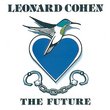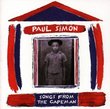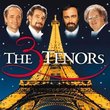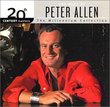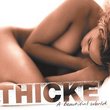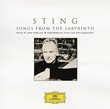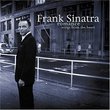| All Artists: Frederick Loewe, Giacomo Puccini, Ture Rangstrom, Jean Sibelius, Richard Strauss, Giuseppe Verdi, Richard Wagner, Argeo Quadri, Bertil Bokstedt, Birgit Nilsson Title: Ritorna vincitor! - The Legendary Birgit Nilsson (2 CDs) Members Wishing: 0 Total Copies: 0 Label: Decca Release Date: 5/13/2003 Genres: Special Interest, Pop, Classical Styles: Vocal Pop, Opera & Classical Vocal Number of Discs: 2 SwapaCD Credits: 2 UPC: 028947379423 |
Search - Frederick Loewe, Giacomo Puccini, Ture Rangstrom :: Ritorna vincitor! - The Legendary Birgit Nilsson (2 CDs)
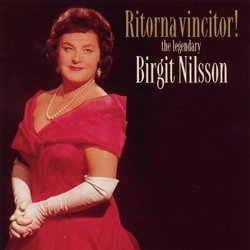 | Frederick Loewe, Giacomo Puccini, Ture Rangstrom Ritorna vincitor! - The Legendary Birgit Nilsson (2 CDs) Genres: Special Interest, Pop, Classical
Disc(s) have no marks |
Larger Image |
CD DetailsSynopsis
Product Description Disc(s) have no marks Similarly Requested CDs
|
CD ReviewsAve Atque Vale, Birgit Nilsson Grady Harp | Los Angeles, CA United States | 01/12/2006 (5 out of 5 stars) "Every opera lover in the world met the news today of the December 25, 2005 passing of Birgit Nilsson with sadness. She was surely one of the greatest opera singers of the 20th century, and in Wagnerian roles alone she was the equal of the great Kirsten Flagstadt. From her beginnings as a simple farm girl in Sweden she rose to the top of all of the international opera houses in the three decades when her voice was in full bloom. Her last public performance was in 1984 but she continued her legend in her masterclasses. She was a phenomenon whose glorious voice and presence will be much missed, but at least she has a huge recorded legacy that adds to her immortality. This 2 CD set is a gathering of excerpts form many recordings and while it does not have the impact of, say, a full performance as Isolde or Brunnhilde or Turandot or Salome, it does offer a generous sampling of the many roles she mastered. Included on this set are arias form 'Macbeth', 'Aida', 'La Forza del Destino', 'Don Carlo', 'Tosca', 'Lohengrin', 'Die Götterdämmerung', 'Elektra', 'Salome', 'Die Frau ohne Schatten', 'Tannhäuser', 'Tristan und Isolde' and songs by Wagner ('Wesendonk Lieder'), Sibelius, Grieg, and Ture Rangström, and yes, even Frederick Lowe! She performs with various orchestras and conductors and pianists. Not usually one for these 'best of' albums, this one is special, especially with the news that this extraordinary artist whose voice could reach the heavens is gone. An aptly titled memento -Highly Recommended. Grady Harp, January 06 " Return to Valhalla OhValhalla Goddess Grady Harp | 03/11/2006 (5 out of 5 stars) "Birgit Nilsson was without a doubt the most powerful soprano of the 20th century, even a greater singer than Maria Callas, despite the fact that audiences loved Callas a lot more. Since her death on December 25th, 2005, I've listened to many of her recordings (and there are plenty, she was well-documented on recording). Nilsson was a versatile singer, and not just a Wagnerian specialist. This recording album of various arias represent her versatility and flexibility and even with all these arias of diverse repertoire, it's still not enough to capture her vast prowess. Not featured on here are her accounts of the Baker's Wife in Strauss' Die Frau Ohne Schatten and Minnie in Puccini's La Fanciulla Del West, or Agathe from Weber's Die Freischutz, not to mention her interpretation of Beethoven's heroine Leonore in Fidelio and Venus from Tannhauser. She was known for her ability to sing both Elisabeth (soprano) and Venus (mezzo-soprano) in Tannhauser!! What we have here are wonderful accounts of arias from diverse operas. Let's analyze some of them, in hopes you can get hooked on Nilsson and check out her full-length opera recordings. Wagner: Ring Des Nibelungen: Every opera connoisseur knows that Birgit Nilsson was the heir to Kirsten Flagstad's throne when it came to singing Brunhilde. Possessing a superhuman and radiant voice, she found a bit of her Swedish self in the mythic character of the Valkyrie Brunhilde. To me, there is no greater Brunhilde. She had a heroic voice so that the Immolation Scene in Gotterdammerung (featured here) is by far the best account. She appears in the Karl Bohm recordings of the Ring and the studio engineered Ring under the baton of George Solti. TRISTAN UND ISOLDE: Her debut role at the Metropolitan Opera was as Isolde. She masters the role, which is possibly the most difficult in Wagner opera, and essays the high tessitura with great aplomb. Not featured here is the great Curse Aria. The Liebestod was a piece of cake for Isolde, and it is featured here. She sings this well, no doubt, but her only fault is that she could never quiet her voice the way some sopranos could. If anyone had trouble hearing Nilssons' mega voice, something was wrong with their hearing! TANNHAUSER: She was able to sing Elisabeth and Venus, and she got into the character's romantic nature. The Hall Aria is on here and it's great. STRAUSS: As excting as her Wagner heroines were, her Strauss heroines were just as impressive. She understood the intensity of the music and delved into the character's psyches, even more so than the Wagner roles. As such, her SALOME is largely regarded as the best on record. While she could not physically convince us as a teenage nubile princess who inflammes the passions of her pagan father, she was able to sing the role with electrifying power and frightening madness. If you listen to the Solti recording, you will note how she could get into Salome's twisted mentality starting from the scene in which she asks for Jochanaan's head and the finale in which she kisses the severed head. This final scene is on here, thank God. Her interpretation of ELEKTRA set the bar high for all subsequent sopranos. She once again got into the character's depravity and lunacy. The intensity of the role never took its toll on her and she tirelessly sings the part in a combo of dramatic power and beautiful singing. Please check out her Elektra recording under Solti again, where she is paired with Regina Resnik. PUCCINI: Yes, Birgit Nilsson sang Puccini and she did a damn good job of it too. Very few critics gave her credit for her superb Puccini heroines. At the Met in the 60's, audiences saw her stage performances of Tosca, Turandot and Minnie from La Fanciulla Del West. Her TOSCA is powerful, unsubtle but dramatically compelling. In the Lorin Maazel recoding opposite Franco Corelli, she was able to make her voice sound more round, warmer and more "Italian". Here we have her "Vissi D'Arte" but she could really deliver in such moments as the Death of Scarpia, the Torture/Interrogation Scene and the Finale. In fact her cry "O Scarpia Avanti Addio!" is possibly the best on record. She sang TURANDOT at the Met opposite Franco Corelli in riveting performances, rivaling any other soprano who sang Turandot at the time. The size of her voice, her regal presence (fashion designer Cecil Beaton made a Chinese Empress costume, complete with a decorative crown, especially for her) and her command of the music made for a stunning Turandot. Check out the EMI recording with Corelli and Scotto. Verdi: She sang Verdi, though it was not a repertoire she followed up on extensively. Audiences saw her as Lady Macbeth, Princess Eboli, Elisabeth Di Valois (from Don Carlos) and Leonora from Forza del Destino. And of course as AIDA. Her Aida is not the most beautifully sung or the warmest, but in sheer volume and grandness she takes the crown. There is a studio recording she sang opposite Franco Corelli and Grace Bumbry. At the Met, audiences saw her paired with Jon Vickers' Radames. Ritorna Vincitor! Aida's first great aria in Act 1 is on here and it's the title of the album. Her LADY MACBETH is by far her greatest Verdi role. The cold, icy, unfeeling way she sings the part makes her Lady Macbeth by far the most wicked and dramatically convincing. Even without the Italian fire in the belly, she could get into character as good as the rest of them. SWEDISH SONGS, BROADWAY AND MOZART: Her account of her native Swedish folk songs are lovely, and in her time, legendary, and even in her heyday as an opera singer she would sing Swedish songs on Swedish radio. As a girl growing up in her father's farm, she sung these folk songs which eventually drew the attention of Conservatory instructors and operatic voice coaches. Broadway ? I'm sorry. This is cute and experimental of her to sing "I Could Have Danced All Night" from My Fair Lady but this is not her forte. Her voice is too big for the role of Liza Doolittle and the waltz-like/operetta song is way out of her league. On a final note, Nilsson sang Mozart, namely the part of Dona Ana in Don Giovanni, which is found on at least two studio recordings, the famous one being the one with Cesare Siepi as Don Giovanni and Leontyne Price as Elvira under the baton of Erich Leinsdorf. Her Dona Ana is neither beautiful nor mannered, she sings with the usual Nilsson bravura and attempts to soften her voice but she shows no real command for the Mozart reperotire and again this was purely experimental for her. LONG LIVE BIRGIT NILSSON! I WILL FOREVER REMEMBER HER AS BRUNHILDE, SINGING WITH SUPERHUMAN POWER AND PASSION IN THAT CLIMATIC IMMOLATION SCENE AT THE END OF GOTTERDAMMERUNG. NO ONE CAN MASTER THAT GRAND SCENE "Fleight Hom, Ih Rabens (Fly home you Ravens!) .."GRANE..MEIN ROSS (Grane My Horse!) HER VOICE GETS STRONGER, HIGHER AND MORE INTENSE, FLYING, FLYING EVER UPWARD TO VALHALLA. " Hear Birgit Nilsson Singing Verdi, Wagner, Strauss And Swe American Evita | U.S. | 05/11/2008 (5 out of 5 stars) "ABOUT THE ALBUM: Ritorna Vinctor! The Legendary Birgit Nilsson, 2003 Decca Music Group Limited, 2-CD set, with notebook, article and photographs of Birgit Nilsson. Compilation album of various excerpts from full-length opera studio recordings available on Decca Records and Columbia Records.
This compilation album became popular upon news of the death of Birgit Nilsson on Christmas Day, December 25, 2005. Nilsson died peacefully inside her private farm in her hometown in Sweden. She had enjoyed a long, prosperous and outstanding career in opera the likes of which we'll never see again. I'm not in the minority when I say that she is really by definition the best soprano of the 20th century. Dramatic sopranos who take on Nilsson's repertoire see her as something of a legend and a goddess who can't be matched by anyone else. Even in past its prime, her voice was strong enough to sing the heavy repertoire of Richard Strauss. In her youth, she took on the most dramatic roles in opera- Brunnhilde, Isolde, Salome, Elektra, Tosca, Turandot, Aida, Lady Macbeth and others, with a unique, steel-covered, high, laser-like, icy and penetrating soprano voice which is also a voice that you can easily identify as hers because no other soprano's voice resembled hers back then or even today. Though she was said to clash with conductors and opera directors, she had a terrific sense of humor and enjoyed pulling pranks during productions of her operas and was also approachable, friendly, warm and down-to-earth. Despite her huge voice, she was never a diva in the classic sense of the word (Maria Callas was a diva in the worst sense) and many remember her as a cheerful and kind lady. This album features 2 cd's that are compiled from studio recordings which feature Birgit Nilsson's artistry. This was her repertoire (though her Donna Ana from Mozart's Don Giovanni is absent) - Verdi, Puccini, Wagner and Strauss, the latter which was her signature and best repertoire. Not featured here is her Leonore from Beethoven's Fidelio. If you have never experienced Nilsson's voice, this is a fabulous introduction and after hearing this album, particularly CD 1, you might just get the temptation to go out and purchase her full length stduio opera recordings. Verdi, Puccini, Wagner, Strauss, Swedish Leider...... Although it was not her strongest repertoire, and it was a repertoire that did not fit her voice, Nilsson sang Verdi operas. After her debut as Isolde at the Met on December 18, 1959, she graced the Met stage with performances of Aida and Lady Macbeth, although those roles were all wrong for her. The opening track is Aida's first big aria "Ritorna Vincitor!". Aida is an Italian-sung, dramatic, lyric-spinto role and sopranos like Renata Tebaldi, Montserrat Caballe, Leontyne Price and Martina Arroyo sang the role with greater lyrical color, texture and dramatic insight. Leontyne Price, especially, owned the role of Aida. Because Nilsson does not have the necessary Italian touch, nor even attempts to sing it as if it were more Italianate, her Aida comes off as more of a strong heroine of Wagner opera. A darker voice is needed and there are moments that call for softer pianissimis and legato. Nilsson does not have these qualities. Nevertheless, her Ritorna Vincitor is strong and exciting to hear, even when it's not beautiful to hear. The same goes for the rest of the arias. She sings "O Don Fatale" on the 2nd track, an aria which was written for a high, mezzo soprano voice. Nilsson sings it in the soprano key and again, her voice blazes and soars to extreme dramatic heights not suitable for Verdi. It is always good to hear Nilsson singing those high notes, though. The worst aria here is "Pace, Pace Mio Dio" Leonora's aria from "La Forza Del Destino". Nilsson never sang this role on stage and rightly so. Her voice has none of the necessary lyric control nor any of the spiritual touches that make up the character of Leonora. When you compare Nilsson's version of the aria to Leontyne Price (this was one of her best interpretations), you can clearly see the difference. Lots of critics found her Lady Macbeth to be remarkable. I don't. This role is again tinged with too much of an Italian spirit. Lady Macbeth calls for a real gritty, dramatic and dark-hued yet flexible soprano voice best left to Callas, Elena Soliotis or Shirley Verrett, who mastered the music's highs and lows. So here's the bottom line. All of the Verdi on here is purely experimental by Nilsson's part and it's not even remotely striking or beautiful. I don't know why they bothered to have compiled so many of her Verdi arias when they could have added more of her Wagner and Strauss. As for Italian opera, Nilsson was the best all around Turandot. She blew away audiences in the mid 60's when she performed Turandot various times at the Met, especially when paired with tenor Franco Corelli. It's a crying shame they don't have her singing "In Questa Reggia" from Turandot or the Riddle Scene as drawn from the mid-60's studio recording with Franco Corelli with Pradelli conducting. Nilsson got into character as Turandot, aided by the Cecil Beaton "Chinese Empress" costume, and her high, goddess-like, "cold" but powerful voice made Turandot exciting to hear and really convinces you that this is a woman not to be messed with. Nilsson sang Tosca and "Vissi D'Arte" is on here. Her Tosca lacks the Italian soul, but she has the right integrity for the part and sings with genuinely dramatic and exciting skills she pulls out from deep within her. Her Tosca is really wonderful to hear and you can hear here entire Tosca on the recording with Franco Corelli, Dietrich Fischer-Dieskau with Lorin Maazel conducting. Now to her best repertoire, Wagner and Strauss. The heavy, Germanic, dramatic, orchestrally grand music of Richard Wagner seems almost exclusively written for Birgit Nilsson. Say by some special power, Wagner was resurrected and alive in the 1960's when Nilsson was taking on the roles of Brunnhilde, Isolde and Elsa at Bayreturh and elsewhere, he would have been blown away by the sheer size, volume and strength of Nilsson's voice. We have here Nilsson singing Elsa's aria from Tannhauser from her Covent Garden perfromance and it captures Nilsson in fine, lyric and youthful voice. Her command of the German language of Wagner opera is further seen in the Brunnhilde of Gotterdammerung, in the aria "Starke Scheite". Whoever made this album failed to fully allow us to hear more of Nilsson's terrific Brunnhilde (they opted instead to allow us to hear her sing Verdi). They could have thrown in Nilsson's signature "Hojotoho!" and scenes from Die Walkure. Brunnhilde's Immolation Aria from Gotterdammerung is a long, nearly 20 minute grand aria which is considered the most daring feat for any soprano; a role that conveys majesty, tremendous drama and fierceness as the Brunnhilde of epic Nordic mythology lits up Siegfried's funeral pyre, throws herself into it on her horse and consequently brings about the end of the world. Nilsson was able to sing Brunnhilde in her sleep. It's too bad we hear only the brief, first part of the aria. But fortunately, we are treated to the entire final scene of Richard Strauss' monumental Salome. Salome, the pagan princess who is rejected by John the Baptist, dances the Dance of the Seven Veils and is rewarded with the head of John the Baptist which she kisses. The excerpt here is from the finale as recorded in studio by Decca from the original LP (which has been remastered for CD) with Georg Solti conducting the Vienna Philharmonic with the additional voices of Gerhard Stolze and Grace Hoffmann as Herod and Herodias. Solti and the Vienna forces bring out every rich, dramatically potent moment with its sensationalism, strangeness, decadence and eeriness. As far as the technical vocal demands of the role, no other soprano could rival her. She sang the part many times (her Buenos Aires/Teatro Colon performance was largely considered her best and her Met Salomes were also impressive). Her big voice could sail through the heavily layered music without any sign of struggle or strain. Her Elektra was also legendary and few singers who sang the role after her retirement from opera could compare. Here, we get to hear some of the more visceral arias from the opera recorded on the Decca label. CD 2 opens with more Wagner - Elsa's Hall Greeting aria Dich Teure Halle, which is wonderfully exciting to hear. The second track is the Liebestod and finale from Tristan and Isolde as lifted from the recording at the Bayreuth Festival with Karl Bohm conducting. The tempi is swift and dramatic and Nilsson sings with fervor and passion, never once lowering the volume of her voice. The rest of CD 2 contains rarities. Nilsson, never forgetting her Swedish roots, sang songs which were essentially her country's version of Lieder. Singing in her native tongue, she is right at home, singing with even more grace and beauty than usual, though still sung with that dramatic high she's always on. It was rumored that Birgit Nilsson's voice was so huge that during recording sessions she was forced to stand back from the microphone because the sounds she produced were too powerful for the engineers to handle. Not knowing what to do with the voice, they often edited the voice a bit so it would fit but Nilsson was disappointed that her voice was not properly recorded. It was indeed a big voice that was said to cut through glass and even some precious metals! She was an outstanding personality and a real force in the opera world. Few sopranos could take her place today. This album is a wonderful tribute to her artistry. " |

 Track Listings (10) - Disc #1
Track Listings (10) - Disc #1

